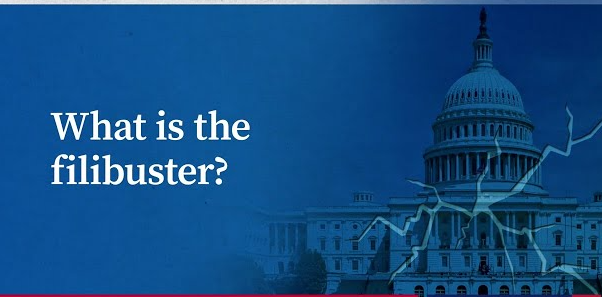In the heated arena of American politics, the filibuster stands as a controversial yet pivotal tradition. Recently, the filibuster has returned to the spotlight due to House Speaker Mike Johnson’s response to former President Donald Trump’s call for the Senate to employ the “nuclear option” to end a prolonged government shutdown. This development has rekindled debates over the role of the filibuster in U.S. legislative procedures.
What is the Filibuster?
The filibuster is a procedural rule in the U.S. Senate that requires a 60-vote threshold to end debate on most legislation and move to a final vote. This rule effectively allows the minority party to prolong debate indefinitely and prevent a vote, unless 60 senators vote to end the discussion. Historically, the filibuster has been regarded as a tool to ensure bipartisan cooperation and prevent majoritarian tyranny. However, it has also been viewed as an obstacle to passing significant reforms.
Trump’s Call and Johnson’s Response
President Donald Trump recently took to Truth Social, urging the Senate to abolish the filibuster using the “nuclear option”—a procedural move that allows the Senate to override the 60-vote rule with a simple majority. Trump argued that this action was necessary to push through the Republican funding bill and resolve the ongoing government shutdown, which has reached its 31st day. The extended standoff has resulted in Senate Democrats blocking the GOP’s short-term funding proposal multiple times.
House Speaker Mike Johnson addressed this issue during a press conference, expressing concerns over disregarding the filibuster. He cautioned that abolishing this long-standing rule could backfire on Republicans if Democrats were to regain control in the future. “The filibuster has traditionally been viewed as a very important safeguard,” Johnson stated. “If the shoe was on the other foot, I don’t think our team would like it.”
The “Nuclear Option”: A Double-Edged Sword
The “nuclear option” refers to changing Senate rules to eliminate the filibuster for certain decisions, enabling legislation to pass with a simple majority. While Senate Republicans utilized this option earlier this year for approving Trump’s nominees, doing so to dismantle the filibuster remains unlikely.
Critics argue that removing the filibuster could allow for abrupt policy shifts whenever control of the Senate changes hands. Furthermore, Johnson pointed out that Democrats might exploit this standard to advance progressive agendas, such as expanding the Supreme Court or granting statehood to Puerto Rico and Washington, D.C.—actions that could fundamentally alter the political landscape.
Current Perspectives and the Path Forward
Despite Trump’s vocal support for abolishing the filibuster, Senate Majority Leader John Thune maintains that its preservation is crucial for maintaining legislative stability. Thune’s spokesperson reaffirmed his stance, emphasizing that the importance of the legislative filibuster remains unchanged. The conversation around the filibuster taps into deeper ideological rifts within U.S. politics, raising questions about the balance between legislative efficiency and minority rights.
The Government Shutdown: Root Causes and Consequences
The current government shutdown, which began over a month ago, stems from a failure to agree on federal funding solutions. The gridlock highlights the challenges of achieving bipartisan cooperation in a divided Congress. According to Johnson, resolving the shutdown is paramount, as it impacts crucial services and resources that Americans rely on daily. Johnson expressed his shared frustration with Trump and the general public, labeling the situation as “madness.”
Conclusion: The Filibuster’s Future
As the government shutdown continues, the debate over the filibuster’s role intensifies. Whether it will be reformed, preserved, or abolished entirely remains a key question in American politics. Meanwhile, legislators must navigate these contentious waters to find solutions that uphold democratic principles while addressing the needs of the nation.
Ultimately, the filibuster serves as both a shield and a barrier within the legislative process, requiring careful consideration of its significance and implications in each session of Congress. As political dynamics evolve, so too will discussions on the future of this pivotal Senate rule.

